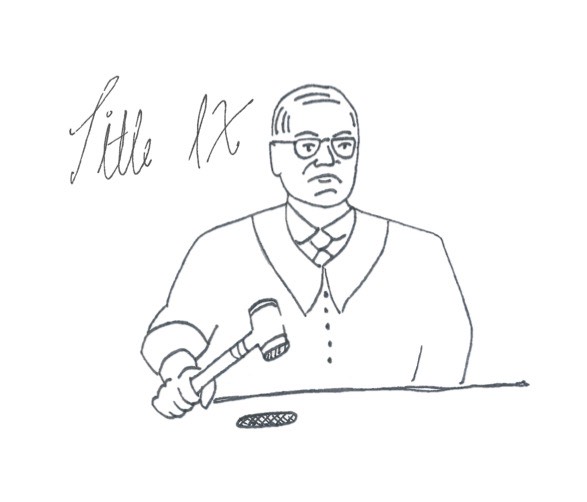Students who need to use Title IX should always expect their case to be handled with care and dedication to the truth. But those who need Title IX resources may soon face obstacles that make it more difficult to come forward about sexual assault or harassment.
The Department of Education released new Title IX regulations earlier this month slated to take effect by August 14. The regulations will require Title IX proceedings to allow cross-examination of all parties involved and switch from a single-investigator model to one involving at least three officials: one to investigate, one to adjudicate and one to issue disciplinary action. The new regulations also mandate the officials investigate incidents that occur on school-affiliated, off-campus properties and include stalking and domestic violence as sexual harassment.
The changes will transform the Title IX process to something resembling criminal proceedings. While there are some positive changes, the downsides of the policy vastly outweigh them, and in some cases directly counteract the positive portions of the regulations. The University needs to be active in advocating against these new regulations before they take effect in August.
One example of this give-and-take is seen in the definitions of sexual harassment and assault. Stalking and domestic violence will now be categorized as harassment under Title IX, a notable blind spot in previous regulations and a step toward justice. But the same regulations also raise the threshold for conduct to count as sexual assault – unwelcome actions have to be “severe” and “pervasive.” While more activities now fall under the purview of Title IX, any conduct has to reach a higher bar to be investigated, which will result in miscarriages of justice on campuses nationwide.

Tara Peckham | Cartoonist
The rest of the changes under the new Title IX policy will discourage survivors from coming forward to make complaints and tip the scales of justice in favor of the wealthy or better-connected. One of the most drastic changes is the introduction of cross-examination in Title IX proceedings. Under the guidelines, a third party – a family member, an attorney, a friend – is able to cross-examine the survivor and the accused party. The education department is seeking to introduce an element from the criminal justice system into Title IX proceedings. But universities aren’t courtrooms, and Title IX officials aren’t judges. This set of guidelines will allow wealthier accused parties – be they students, officials or professors – to evade justice by hiring an expensive attorney and force survivors to relive traumatic events during cross-examination, disincentivizing them from speaking up about their assault in the first place.
The new changes will also lengthen the time until justice is served in Title IX proceedings. By eschewing the single-investigator model in favor of multiple parties, investigations will take longer, and survivors will spend more time reflecting on disturbing events in vivid detail, especially since information may fall through the cracks as cases move from one official to another. The changes may also force survivors to explain their case over and over again to new people. GW officials adopted the single-investigator model to replace the six-person hearing board that complainants previously had to face, which received criticism. The return to a multiple-investigator model creates a lengthy and unnecessary obstacle to justice.
Taken as a whole, the guidelines do not focus on assisting survivors – rather, they are more of a measure to prevent theoretical false accusations from leading to unwarranted disciplinary action. The idea that false allegations of misconduct are widespread is simply not reflective of reality – rather, it is a talking point often parroted by opponents of efforts that support justice for survivors. It is valid to support a more formalized process for determining guilt or innocence, but these new guidelines go far beyond that – they allow perpetrators of sexual assault to be let off the hook.
For these new changes to be implemented, GW – which receives federal funding and thus must adopt these rules – will also need to hire and train people to take on the roles of the multiple investigators that the proposal details, in addition to updating definitions and creating new procedures. Yet universities have relatively little time – just three months – to implement these rules. This is problematic given the unprecedented pandemic that has evacuated campuses nationwide. While all federally funded universities have to comply with these new orders, the deadline to implement them came at the wrong time, as higher education officials are occupied with issues threatening their institutions’ solvency.
But administrators at GW are not powerless and should take action to help survivors and bring perpetrators to justice. GW’s officials should join administrators from other colleges, like University of California President Janet Napolitano, in voicing opposition to these changes. And given that organizations like the American Civil Liberties Union are issuing court challenges, the University should explore filing amicus briefs to try and help block these new guidelines. In the meantime, GW can release information to the student body explaining what these new rules mean for its students.
The education department’s imposition of these new guidelines will put survivors through even more trauma and hardship than they have already endured, while creating opportunities for perpetrators of sexual assault to get off scot-free. No one who turns to a university’s Title IX office deserves to be put through brutal cross-examination where traumatic details are rehashed. Unless these new changes are rolled back, colleges will enter an era where those who commit sexual assault will face even less accountability, and those who experience it will receive even less support.
The editorial board is composed of Hatchet staff members and operates separately from the newsroom. This week’s piece was written by opinions editor Hannah Thacker and contributing opinions editor Andrew Sugrue based on conversations with The Hatchet’s editorial board, which is composed of managing editor Parth Kotak, managing director Kiran Hoeffner-Shah, design editor Olivia Columbus, sports editor Emily Maise and culture editor Anna Boone.


